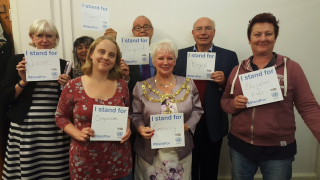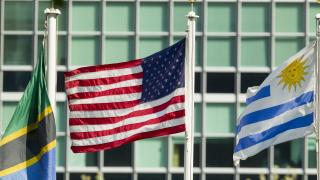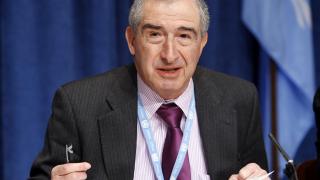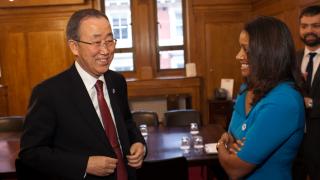
UNA-UK worked with professional pollsters, ComRes, on unique research that compares the personal values of the British public with their expectations of government.
Our poll discovered that:
-
70% of Britons think the British government should speak out when an ally abuses human rights
-
Over half of British adults report that it is equally important to help strangers as it is to look after your community
-
The majority of Britons think strong international relationships are more important than a powerful military
ComRes interviewed 2,033 GB adults online, on 16th and 17th November 2016. Data was subsequently weighted using British Polling Council certified polling techniques to be representative of all adults in Great Britain aged 18+. Full results and data tables are available here.
Key findings
Human rights - Britons don't tolerate abuse and don't expect their Government to either
lf their friend was doing something morally wrong, two in three (65%) of us would tell them. An even greater proportion (70%) think the British government should do the same when an ally abuses human rights and just 16% saying the government shouldn’t intervene in its allies’ issues.
As a nation, and as individuals, the cause of human rights is clearly deeply valued and popular, reflecting our long and proud history in this area. The UK played a leading role in the development of both the Universal Declaration of Human Rights and the European Convention on Human Rights.
Peace and security - strong international relations are more important than a powerful military
Slightly more than half (54%) of Britons feel a strongly secured house is more important than knowing and trusting their neighbours when it comes to feeling safe in their own home. When it comes to national security however, the majority (57%) believe strong international relationships trump a powerful military.
The British public's approach to national defence is mixed, but the majority feel that national security is based on good relationships with our national neighbours, not military might.
Sustainable development - personally generous, but not as a nation?
The contrast between our personal and national attitudes to helping strangers is marked. Six in ten of us (57%) believe that it's just as important to look after people we know as those we don't, but only half of that number (30%) believe British foreign policy should treat UK and non-UK citizens equally. An even smaller number (28%) of us say that our foreign aid budget should be spent on tackling humanitarian crises overseas.
On an individual level we tend to be indiscriminate and generous. However, we seem much more cautious about our approach as a country. Is this because we do not believe that the Government is an efficient donor, or is it that we don't see international development as in our own interest? The UK is the world's second most generous giver - has the barrage of negative media stories on overseas aid led to a lack of pride among our citizens?
International law - law-abiding Britons don't see the value in international legislation
Four out of five British adults (79%) wouldn't consider disobeying the law even if obeying it meant they would lose out financially. However, half of British adults (50%) say that the British government should not always adhere to international laws if doing so means changing our domestic laws.
Law-abiding British people are happy to sacrifice some of their personal soverignty for the greater good. But they seem to draw the line at rules agreed on an international level. This reaction is understandable, but the most pressing problems of the 21st century: climate change, international terrorism and cyber crime do not respect national borders and require a coordinated response.
Climate change - a personal priority, a bigger issue for Government
Protecting the environment is a priority for just over half of British adults (58%). Slightly more (65%) believe that the British government should make it a domestic and international priority.
Clearly the environement matters to us, and while we believe that our own efforts have an effect, British citizens seem to look to our government for leadership on this issue.
A global Britain
Britain is an outward-looking country whose values are closely aligned with those enshrined in the UN Charter.
The answers to our questions on rules and giving show that Britons are a naturally law abiding and compassionate people. The fact that this doesn’t directly translate into Britons' views on international law and overseas aid suggests that there is a sense that these things are in not the national interest, or don't relate to British values. UNA-UK strongly believes that they are, and will be making that case in 2017 and beyond, through our campaign to Keep Britain Global, our 2017 conference and our ongoing work and publications.
Alongside this poll UNA-UK members and supporters have been using the hashtag #StandFor to express their values and beliefs. They were also asked these same questions in a public survey, over 400 people answered. While this group was self-selecting, and so do not provide a representative sample akin to our poll, the results were clear. Their values replicated, even more emphatically, the personal values of the British public, and when it came to international action they felt the UK should do more in every instance:
- 92% felt that when allies of the British government abuse human rights, the government should speak out.
- 94% that the British government should make protecting the environment a domestic and international priority.
- 87% that strong international relationships are more important than a powerful military for national security.
- 76% that the British government should always adhere to international laws.
- 65% that the British government's foreign policy should treat UK and non-UK citizens equally.
- And 87% that the British government should spend our foreign aid budget on tackling humanitarian crises overseas.
UNA-UK supporters are clearly committed to the work of the Organisation and we look forward to working together to make the case for a Global Leadership, Global Solutions and Global Citizens in 2017.




